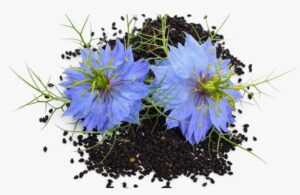Exploring Nigella Sativa: The Ancient Seed with Modern Health Benefits
Nigella sativa, also known as black seed or black cumin, is a plant that has been valued for its medicinal and culinary properties for thousands of years. Often referred to as the ‘seed of blessing’ (Habbat al-Barakah in Arabic), Nigella sativa has earned a reputation in both traditional and modern medicine for its remarkable health benefits. In this article, we’ll explore what Nigella sativa is, where it grows, its vast array of benefits, how to use it, and the health conditions it helps manage. Exploring Nigella Sativa:
—
### **What is Nigella Sativa?**
Nigella sativa is a flowering plant from the Ranunculaceae family, native to Southwestern Asia and the Mediterranean region. It produces small black seeds commonly referred to as black seeds or kalonji. These seeds have been used for centuries in Ayurvedic and traditional medicine as a therapeutic remedy to treat various ailments. Exploring Nigella Sativa:
Black seeds are most renowned for their bioactive compound, thymoquinone, which is responsible for many of their potent medicinal properties, such as anti-inflammatory, antioxidant, and antimicrobial effects.
—
### **Where Does Nigella Sativa Grow?**
Nigella sativa thrives in warm climates and is cultivated in various parts of the world, including Southwest Asia, the Middle East, South Asia, Northern Africa, and parts of Europe. Some of the largest producers include India, Turkey, Egypt, Saudi Arabia, and Pakistan. The seeds are often grown in fertile, well-drained soil and harvested after the plant flowers and its seed capsules develop.
—
### **What Are the Benefits of Nigella Sativa?**
Nigella sativa seeds and their oil are packed with nutrients like essential fatty acids, vitamins, and minerals that contribute to their health-promoting properties. Here are some of the key benefits:
1. **Boosts Immunity**: Nigella sativa strengthens the immune system, helping the body fight infections more effectively.
2. **Rich in Antioxidants**: The seeds contain compounds that combat oxidative stress, reducing the risk of chronic diseases.
3. **Anti-Inflammatory Properties**: It helps alleviate inflammation, making it beneficial for conditions like arthritis, asthma, and irritable bowel syndrome (IBS).
4. **Supports Digestive Health**: It aids digestion, reduces bloating, and provides relief from ulcers.
5. **Improves Skin and Hair**: The oil derived from the seeds is often used in beauty products to treat acne, promote hair growth, and hydrate the skin.
6. **Weight Management**: Some studies have shown that black seed oil may aid in reducing body mass index (BMI) and support weight loss efforts.
7. **Enhances Brain Health**: Its antioxidant properties help protect against cognitive decline and neurodegenerative diseases like Alzheimer’s.
8. **Balances Blood Sugar**: Nigella sativa may help regulate blood sugar levels, making it particularly beneficial for individuals with diabetes.
9. **Supports Heart Health**: It helps maintain healthy cholesterol levels and reduces blood pressure, all while protecting against cardiovascular illnesses.
10. **Fights Infections**: Thanks to its antimicrobial properties, black seeds can combat bacterial, viral, and fungal infections.
—
### **How Can Nigella Sativa Be Used?**
Nigella sativa can be used in various forms depending on your needs, including seeds, powder, or oil. Here’s how you can incorporate black seed into your diet and daily routine:
– **In Cooking**: The seeds have an earthy, nutty flavor and are commonly sprinkled on bread, naan, bagels, or salads. They can also be added to curries, soups, or stews for added texture and flavor.
– **As a Tea**: Black seeds can be steeped in hot water to make tea, which is great for soothing sore throats or boosting immunity.
– **In Smoothies or Yogurt**: Add a teaspoon of black seed powder or oil to your smoothies or yogurt for a nutritional boost.
– **As an Oil**: Black seed oil can be taken orally (usually 1–2 teaspoons a day) or applied topically to treat skin conditions, promote hair growth, and alleviate joint pain.
– **As a Supplement**: Capsules containing black seed oil or extract are available for those who prefer taking it as a supplement.
—
### **What Health Conditions Can Nigella Sativa Help Treat?**
Numerous studies and centuries of traditional use suggest that Nigella sativa has therapeutic properties that address a wide range of health concerns. Here’s an overview of what it can help:
1. **Asthma and Respiratory Issues**: Black seed oil has been found to reduce inflammation in the airways, improve breathing, and alleviate symptoms of asthma and bronchitis.
2. **Type 2 Diabetes**: Regular use of Nigella sativa can help lower blood sugar levels, cholesterol, and triglycerides, making it an effective complementary treatment for diabetes management.
3. **Rheumatoid Arthritis and Joint Pain**: With its anti-inflammatory effects, the seeds help reduce pain, swelling, and stiffness associated with arthritis.
4. **Hypertension**: The seeds may help regulate blood pressure, protecting against hypertension-related complications.
5. **Eczema and Psoriasis**: Applied topically, black seed oil soothes skin conditions like eczema, psoriasis, and acne.
6. **Cancer**: Preliminary research indicates that thymoquinone may have anti-cancer properties, potentially inhibiting the growth of certain cancers like pancreatic, breast, and colon cancer.
7. **Infections**: Its antimicrobial properties make it effective against bacteria like *Helicobacter pylori* (responsible for stomach ulcers) and fungus like *Candida albicans*.
8. **Fertility Issues**: Black seed oil is used in natural medicine to enhance fertility in both men and women by improving sperm quality and balancing hormones.
9. **Obesity**: Regular use of black seed oil may increase fat metabolism and reduce BMI over time.
10. **Allergies and Sinus Infections**: The antihistamine effect of Nigella sativa can help alleviate seasonal allergies, hay fever, and sinus infections.
—
### **Precautions and Considerations**
While Nigella sativa is generally considered safe, there are a few precautions to keep in mind:
– Pregnant women should avoid large doses, as it may induce uterine contractions.
– People with low blood pressure should monitor their use, as Nigella sativa can further lower blood pressure.
– Always consult a healthcare provider before starting any new supplement, especially if you’re taking medications or have underlying health conditions.

Beyond the Seed: Unveiling the Versatile Culinary Power and Health Benefits of Nigella Sativa
Nigella Sativa, also known as black cumin, black seed, or kalonji, is far more than just a pretty topping for your naan bread. With its distinct peppery flavor and a history steeped in ancient medicine, this tiny seed is finding its place in modern kitchens and wellness routines for good reason. Let’s delve into the practical culinary uses of Nigella Sativa, explore the dishes it elevates, and uncover its impressive health benefits, including its potential as a supportive agent against cold and flu.
From Spice Rack Staple to Culinary Star: Practical Dishes with Nigella Sativa
Nigella Sativa’s unique, slightly bitter, and pungent flavor profile offers a fascinating alternative to traditional spices. It’s not just about sprinkling it as a garnish; you can incorporate it throughout the cooking process to add depth and complexity to your dishes. Here are some practical applications:
Bread and Baked Goods: This is perhaps the most common use. Sprinkle Nigella Sativa on naan, bagels, bread loaves, and even pastries before baking for a distinctive aroma and visual appeal.
Roasted Vegetables: Toss vegetables like potatoes, carrots, butternut squash, and cauliflower with olive oil, salt, pepper, and a generous pinch of Nigella Sativa before roasting. The heat releases the seeds’ nutty flavor, adding a delectable layer of complexity.
Salads and Dressings: Toast the seeds lightly and sprinkle them on salads for a crunchy texture and peppery bite. Alternatively, infuse Nigella Sativa seeds in olive oil to create a flavorful salad dressing.
Curries and Stews: Add a teaspoon or two of Nigella Sativa seeds to your favorite curry or stew during the cooking process. It complements both meaty and vegetarian dishes, enhancing the overall flavor profile.
Pickles and Chutneys: Nigella Sativa is a classic ingredient in many Indian pickles and chutneys. Its pungent flavor adds a welcome kick and helps preserve the flavors of the other ingredients.
Rice Dishes: Toast Nigella Sativa seeds in a little ghee or oil before adding them to pilafs or biryanis. Their aroma infuses the rice, creating a fragrant and flavorful side dish.
Egg dishes: Add a pinch of Nigella Sativa to your omlettes or scrambles for an earthy flavor.
Which Dishes Benefit the Most? A Flavor Preference Guide
Nigella Sativa’s flavor profile works exceptionally well with:
Earthy Flavors: Dishes featuring root vegetables, lentils, beans, and mushrooms are enhanced by its earthy and peppery notes.
Spicy and Savory Dishes: Curries, stews, and roasted meats benefit from the added depth and complexity it brings.
Dishes That Need a Touch of Bitterness: The slight bitterness of Nigella Sativa can balance out sweeter flavors in baked goods or dressings.
Unlocking the Potential: Health Benefits of Nigella Sativa
Beyond its culinary applications, Nigella Sativa boasts a wealth of potential health benefits, many of which have been studied and documented. These benefits are largely attributed to its active compound, thymoquinone.
Anti-inflammatory Properties: Thymoquinone is known for its potent anti-inflammatory properties, which may help alleviate symptoms associated with inflammatory conditions such as arthritis.
Antioxidant Powerhouse: Nigella Sativa is rich in antioxidants, helping protect the body against damage caused by free radicals.
Immune System Support: Studies suggest Nigella Sativa can help boost the immune system, making it more resilient against infections.
Respiratory Health: It is traditionally used to ease respiratory problems like asthma, allergies, and coughs.
Digestive Health: It may aid in digestion by reducing bloating, gas, and other digestive discomforts.
Blood Sugar Regulation: Some studies suggest it can help regulate blood sugar levels.
Nigella Sativa and the Cold and Flu: A Natural Ally?
While not a replacement for medical treatment, Nigella Sativa shows promise as a supportive agent during cold and flu season. Its anti-inflammatory and immune-boosting properties may help alleviate symptoms and shorten the duration of illness. Traditionally, it has been used in several ways:
Infused Honey: Mixing Nigella Sativa seeds with honey creates a soothing cough syrup.
Aromatherapy: Diffusing Nigella Sativa oil or burning the seeds may help clear congestion.
Warm Beverages: Adding a pinch of seeds to herbal teas or warm water with lemon and honey can provide relief from sore throat and cough.
Important Considerations:
Consult a Healthcare Professional: Always consult your doctor before using Nigella Sativa for medicinal purposes, especially if you have any underlying health conditions or are taking medications.
Start Small: Begin with small amounts and gradually increase intake to assess your tolerance.
Pregnancy and Breastfeeding: Nigella Sativa is not recommended for pregnant or breastfeeding women.
Allergies: While rare, some individuals may be allergic to Nigella Sativa. If you experience any allergic reaction, discontinue use.
Nigella Sativa is a versatile and fascinating ingredient that deserves a place in your kitchen and your wellness routine. From adding depth to your favorite dishes to potentially supporting your health, especially during cold and flu season, this tiny seed offers a powerful punch. Embrace its unique flavor and explore its numerous benefits to elevate your culinary creations and well-being. Remember to always consult with a healthcare professional before using Nigella Sativa for medicinal purposes.
Nigella sativa, or black seed, is a powerful natural remedy with a long history of use in traditional medicine. From boosting immunity to improving heart health and treating skin conditions, its health benefits are extensive and well-documented. Whether you use it as a spice in your kitchen, an oil for skincare, or a supplement for health management, black seed is a versatile and valuable addition to your wellness routine.
Integrating Nigella sativa into your life could be the key to unlocking a host of health benefits—one blessing-filled seed at a time! —
You can read below writings
The Humble Onion: A Culinary Staple with Remarkable Benefits
What is White Cabbage and Where Does it Grow
What is Coffee and Where Does It Grow
Lemon: The Tangy Wonder – Benefits, Uses, and More






